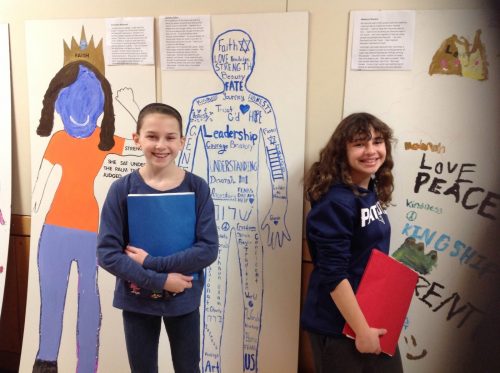When I was in nursery school, one of my favorite stories was The Little Engine that Could. My teacher played the record for our class and we would chant along with the narrator, “I think I can, I think I can….” I was inspired that this little engine who wasn’t supposed to succeed did just that, through hard work, determination and faith. This story has stuck with me all these years and has become a metaphor for how I approach challenges. When Combined Jewish Philanthropies (CJP) approached Temple Chayai Shalom in Easton, MA, with the offer to partner with us to plan and implement transformational change in our part-time Jewish education setting during the spring of 2010, our community immediately recognized and accepted this as an opportunity for learning and growth.
Temple Chayai Shalom (TCS) is a small reform congregation with 215 families and 185 students in our religious school. The temple is located 30 miles south of Boston, just outside the hub of robust Jewish life, a reality which limits our resources and can make our work challenging. Conversations with CJP staff, our CJP educational consultant and members of our congregation led the school committee to rethink our entire approach to Jewish supplementary education, rebranding our education program as SULAM – a Source of Understanding, Learning and Meaning. As part of this initiative this group recommended that we pilot Project Based/Expeditionary Learning for our 3rd and 4th graders in the spring of 2011.
Using Ron Berger’s An Ethic of Excellence as a starting point, we considered how to modify Project Based/Expeditionary Learning for a congregational school setting meeting 2.5 hours/week. We knew that our expeditions needed to include student voice, tap into teacher passion, serve a real purpose, offer students a sense of mastery, utilize outside experts and be of high quality. These were just some of many factors to consider and we had to be strategic in creating a plan that would give us the best chance for success.
One of the first challenges we faced was how to prepare and adequately support the teachers who were part of the pilot expedition. Working with a subset of our teaching staff gave us the opportunity to thoughtfully craft a professional learning plan that would meet their diverse needs. The temple Board of Directors agreed to allocate additional funds so we could actualize this plan.
Our teachers are deeply committed to Jewish education and to the families at TCS but come from varied professional backgrounds; some are educators by training, while others work in a non-related field. We crafted a multi-layered approach, beginning with workshops facilitated by our CJP educational consultant to explore Project Based/Expeditionary Learning, continuing with individual and team meetings to write the curriculum and gather resources and finally, meeting as a team after class each week for reflection and continued learning. As we prepared to launch the pilot, the teaching staff was understandably nervous; we were asking them to do something well outside of their comfort zone.
We did three things to help alleviate teachers’ anxiety. First, we recognized the unique talents of each of our staff members and developed curriculum that played to their strengths. We encouraged our teachers to share their talents with one another, empowering them to be full partners in creating a successful expedition.
Second, we gave them permission to “fail.” Recognizing that there would be missteps along the way and that we didn’t expect them to be experts alleviated some of their anxiety. At our weekly reflection meetings teachers were encouraged to share successes as well as failures. The conversations were constructive, teasing out the learning from every experience, giving us the opportunity to “fail forward,” making our expedition richer and stronger.
Lastly, we kept the big picture in mind. Our goal was to offer our students a meaningful, authentic and relevant Jewish learning experience. We pushed our teachers to be excellent, to think differently about planning and provide exceptional experiences for their students.
We learned much from our first expedition about how to develop rich content and support our teachers appropriately. Given the overwhelmingly positive response from parents, students and teachers, we expanded Project Based/Expeditionary Learning to our 5th and 6th grades the following year.
Project Based Learning has been our core model for Judaic learning in grades 3-6 for the past four years. We have invested time and financial resources in order to provide the right conditions to transform our school into the robust learning environment it is today. As a congregation, we ensure that our budget includes funds for ongoing professional learning and paid reflection time for our teachers knowing that these are essential to create lasting and systemic change. We have retained a high percentage of our staff during this time. With each expedition, they become more confident and excited to learn with and guide their students. Our innovative model also attracts teachers to our program. As new staff join our program, our experienced teachers serve as mentors providing knowledge and support. One new teacher shared, “I’ve been familiar with PBL and that’s what made me interested in teaching at SULAM.”
The process is ongoing; we are constantly tweaking our professional development for teachers as well as our content and expeditions. Like The Little Engine that Could, our small congregation continues to plug along with fierce determination, proving that even small congregations can have a significant impact on children, families and the field of Jewish education.
Kim Bodemer is the Director of Congregational Learning at Temple Chayai Shalom, Easton, MA.
This is the second in a series of blog posts for Jewish Learning Connections. Read the introductory post.
This post has been contributed by a third party. The opinions, facts and any media content are presented solely by the author, and JewishBoston assumes no responsibility for them. Want to add your voice to the conversation? Publish your own post here. MORE


